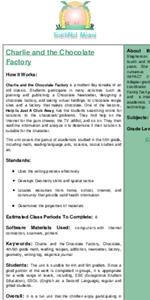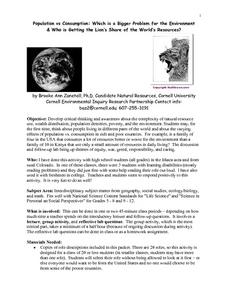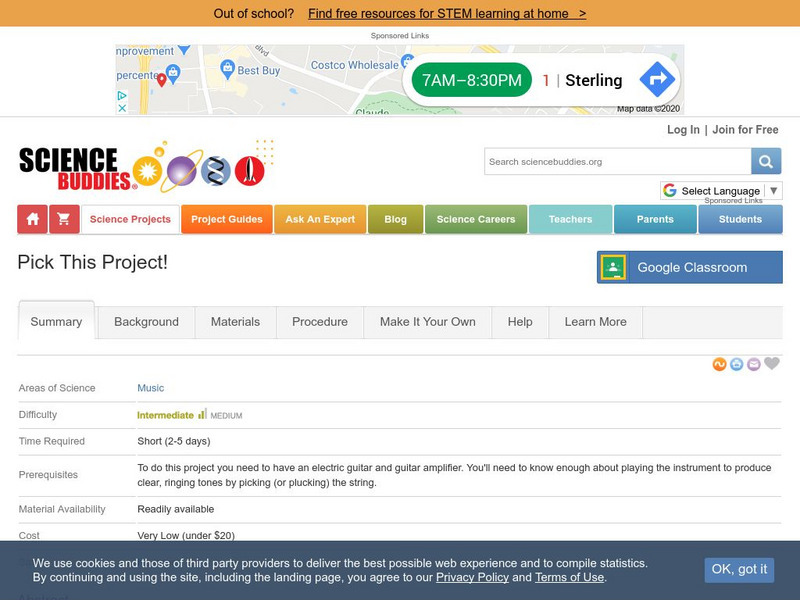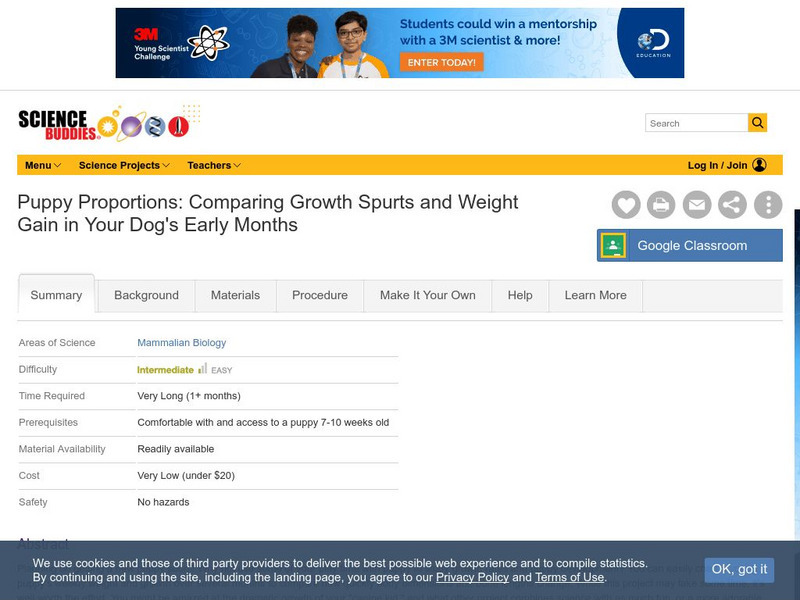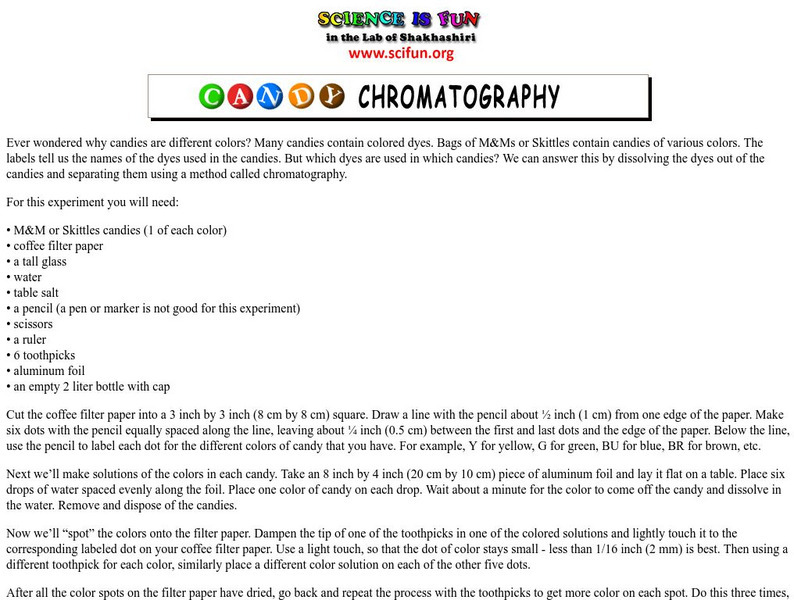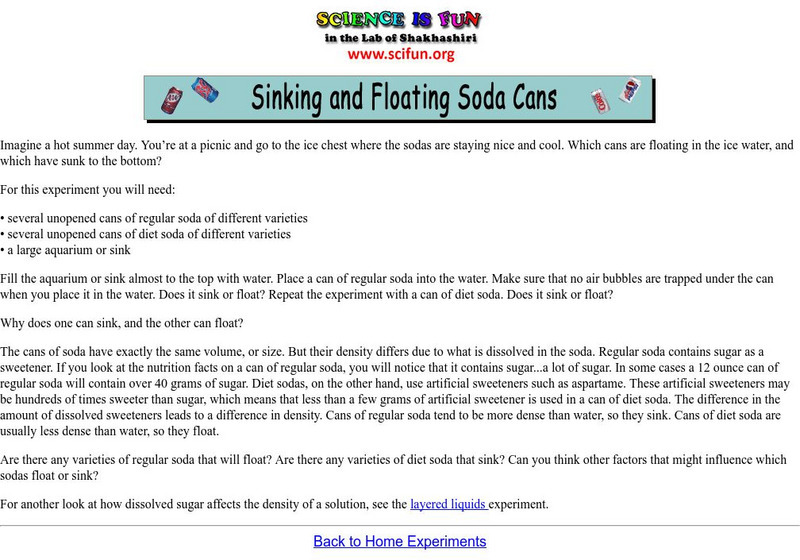Curated OER
A Whirlwind Tour
Students explore volcanoes, hurricanes, and tornadoes through the use of the Internet.
Curated OER
Now That's Using Your Head!
Explore linear measurement. Scholars will measure the circumference of their head and the distance they can jump. Information is recorded, averages are calculated, and a data table is completed. They then determine possible relationships...
Curated OER
Soils are the Pits!
Students dig soil pits in order to observe soil features and the factors of soil formation and soil forming process. Students also examine the relationships among different soils in a series of soil pits.
Curated OER
"Investigating Hazardous Materials"
Eighth graders gather Internet information on a variety of related topics concerning hazardous waste.
Curated OER
Tasty Solution
Students examine the difference between a solvent, solute and solution. In this solutions lesson students complete an experiment and observe what happens when a solution is stirred.
Curated OER
Lost Baby
Students simulate the steps involved in creating a DNA fingerprint by the RFLP technique. They analyze RFLP patterns to determine the parentage of a missing baby.
Curated OER
Transmitter Hunt
Students experiment with radio transmitters. In this transmission of waves instructional activity, students use an FM radio, an attenuate, and the frequency to locate a radio transmitter. Students discuss outcomes.
Curated OER
Making Your Own Sampling Tools
Students begin a class recycling project. They create data sampling equipment using their own designs and test them in the field.
Curated OER
Wacky Water Critters
Students recognize the biodiversity that exists in a wetland ecosystem. They identify individual wetland organisms. Students define, identify, and comprehend the importance of adaptations. They describe the process of metamorphosis.
Curated OER
Cell Reproduction and Inheritance
Pupils determine their inherited characteristics from their parents. In this biology lesson, students study the life of Mendel using an interactive website. They differentiate dominant and recessive characteristics.
Curated OER
States of Matter Lessons
Teachers can give their students hands-on ways to explore solids, liquids, and gases with these lesson plans.
Curated OER
Charlie and the Chocolate Factory
Fifth graders participate in a variety of math and language arts activities based on chocolate.
Lunch Lab
Exercise
This is the perfect resource for helping youngsters understand the importance of physical activity in their daily lives. The lesson and its worksheets focus on brainstorming a variety of fitness activities, such as games you can play...
Curated OER
Goobers. Goobers? Goobers!
Students begin the lesson by noting the many ways in which to use peanuts. In groups, they use the internet to research the work of George Washington Carver. They discover the allergies and nutritional information of the peanut and...
Curated OER
Population Vs Consumption: Which is a Bigger Problem for the Environment & Who is Getting the Lion's Share of the World's Resources?
Students develop critical thinking and awareness about the complexity of natural resource use, wealth distribution, population densities, poverty, and the environment. They think about people living in different parts of the world and...
Curated OER
Nutrition: Gregory the Terrible Eater
Students listen to a story about a goat who craves human food. They discover the four basic food groups and discuss what they might eat if they were terrible eaters. Students retell the story by looking at the pictures. They complete...
Bill Nye
Bill Nye: Bill Nye Online Science Lab
Bill Nye's Online Science Lab offers home demos for planetary, physical, and life science, a "Question of the Week," e-cards, episode guides, and lots of fun facts. A great resource for students looking for science-fair project or lab...
Cold Spring Harbor Laboratory
Harlem Dna Lab: Bacterial Transformations
In this lab, students will transform E. Coli bacteria to be resistant to ampicillin and to glow green. Students will use genetic engineering techniques to insert plasmids into the bacteria. The site contains background reading,...
Science Buddies
Science Buddies: Pick This Project!
This lab will help you understand the physics of vibrating strings, and find out why the tone of an electric guitar changes when you switch between the different pickups. If playing guitars is a hobby of yours, this experiment makes an...
Science Buddies
Science Buddies: Puppy Proportions: Growth Spurts & Weight Gain in a Dog
Puppies prove to be a fun and useful aid in this adorable experiment! By having access to, and measuring a puppy's body dimensions over a period of weeks or months, you can discover if segments of canine anatomy develop at different...
Science is Fun
Fun Science: Candy Chromatography
Using simple household items like M&Ms and coffee filters, you can demonstrate paper chromatography. This simple lab will show you the dyes that make up the different color coatings on M&Ms.
PBS
Pbs Kids: Colored Water Convection
This PBS site allows users to learn more about water convection as they discover how to demonstrate the way convection currents form. A fun science project!
Science is Fun
Fun Science: Sinking and Floating Soda Cans
Why do some pop cans float in water while others don't? This easy experiment is a great example of the principle of density.














